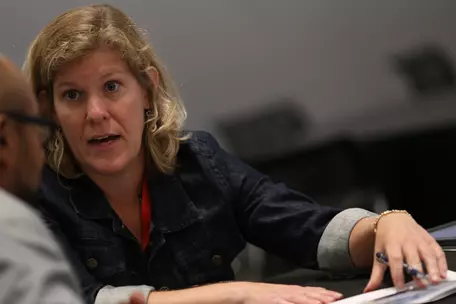Engaging Students in Understanding the Earth System as it Intertwines with Key Societal Issues
A workshop for K-8 teachers at Goldschmidt 2018
Hynes Convention Center Room 102
Boston, MA
Tuesday, August 14, 2018
2:15-5:15pm
Conveners:
Lisa Gilbert, Williams College and Pete Berquist, Thomas Nelson Community College
Workshop Overview
Bringing sustainability into elementary and middle school classrooms offers a range of benefits to student learning, such as establishing relevance for your students and empowering them to begin thinking about society and the Earth on a broader scale. This professional development workshop is designed to help K-8 teachers infuse more societal relevance into their classrooms with InTeGrate teaching materials. InTeGrate materials challenge students to address interdisciplinary problems, engage in geoscientific habits of mind, work with authentic geoscience data and develop systems thinking. During the workshop, teachers will gain hands-on experience working with these NGSS-aligned, freely available materials and adapting them for K-8 use.
Workshop Goals
The goals of this workshop are to support teachers in:
- using new InTeGrate resources in a K-12 class,
- incorporating interdisciplinary content in their classes,
- encouraging their students to draw connections between science and society.
- In advance of the workshop, familiarize themselves with the resources and information available on the workshop website.
- To optimize workshop outcomes, participants are encouraged to participate in all workshop activities, including pre-workshop preparations, scheduled workshop sessions, small group work, and follow-on activities.
Who Should Attend
This workshop is designed primarily for K-8 teachers.
If you are a high school teacher, we recommend the Thursday workshop.
Workshop Program and Format
This workshop will involve completing several InTeGrate activities, which can be adapted for use in your classroom. Although the teaching materials are freely available online, some instructor materials including answer keys and rubrics are protected. You can register as an instructor at anytime, but because it can take 24 hours to activate your account, we highly recommend registering before arrival at the workshop. Note: To fully participate in this workshop, participants will need to bring a laptop or tablet.
14:15-14:35 Orientation
- Goals of workshop
- Introductions
- Overview of InTeGrate resources, guiding principles and NGSS: Introductory slides (PowerPoint 2007 (.pptx) 36.5MB Aug14 18)
14:35-16:00 InTeGrate materials
- Do a 15-minute InTeGrate activity; de-brief
- Before we begin, please complete Poll 1
- Student Handout for Evaluating a System Diagram Activity (Microsoft Word 2007 (.docx) 97kB Jul15 15)
- After we finish, please complete Poll 2
- Would this work in your classroom?
- Practices Web (Acrobat (PDF) 101kB Aug13 18) from Nyman and St. Clair (2016)
- Choose 1-2 units from an InTeGrate module best aligned with your interests. Divide into small groups to complete the unit(s). Materials provided.
- Systems Thinking Unit 1
- Soil, Systems, and the Environment Unit 1
- Soil, Systems, and the Environment Unit 2
- We used these files specifically for MA Soils Unit 2 Maps for MA (Microsoft Word 2007 (.docx) 1023kB Aug14 18)
- Lead in the Environment Unit 1
- Changing Biosphere Unit 4
- Climate of Change Unit 4
- Natural Hazards and Risks: Hurricanes Unit 2
- Carbon, Climate, and Energy Resources: The Carbon Cycle Unit 2
- (Additional units will be linked based on participant interest)
- Discussion: What modifications or additional resources would be necessary to implement the unit in your classroom?
16:00-16:10 [break]
16:10-16:30 Report out and discussion
16:30-17:00 Next steps
- Search InTeGrate using the NGSS; explore additional resources and instructor stories
- Write individual action plans
17:00-17:15 Wrap up
- Summary
- Evaluation
- Thank you!
Additional Resources
Strand maps from Jane Heinze-Fry
- NGSS Weather-climate strand map. Developed from the Next Generation Science Standards, (NGSS), this resource shows a K-12 learning progression of how the knowledge and skills needed to understand and address weather/climate change may develop throughout the schooling years. They are color-coded by science discipline. The smaller clear rectangles link the standards to the English, Math, and Social Studies standards.
- MA Weather-climate strand map. Developed from the new Massachusetts Science, Technology, Engineering Standards, this resource shows a K-12 learning progression of how the knowledge and skills needed to understand and address weather/climate change may develop throughout the schooling years. They are color-coded by science discipline. The smaller clear rectangles link the standards to the English and Math standards. Social Studies links will be forthcoming.
- Climate change resource-linked concept map. A bubble near the top invites you to "Start Here." When you click on the image of a movie film, you can click the link that describes how to navigate the map. Throughout the map, when you click on the small boxes at the bottom of the concept bubbles and then click on the links that appear in the dropdown menu, you will connect directly to hundreds of climate change education resources. This work is in progress all the time as more resources are developed.
Registration and Cost
Please use the Goldschmidt Registration form and the code Charles18 to register for this workshop. The workshop registration fee is set by the Goldschmidt Conference organizers at $95 for the full day for a limited number of K-12 educators and administrators who register by June 13 ($135 after June 13). In addition to this workshop, your registration includes access to a full day of professional development opportunities: mentoring over breakfast (meal included), morning scientific sessions, a mid-day plenary talk, and an evening poster session (refreshments included).
Sponsorship
This workshop is also sponsored by the National Association of Geoscience Teachers.

![[creative commons]](/images/creativecommons_16.png)



